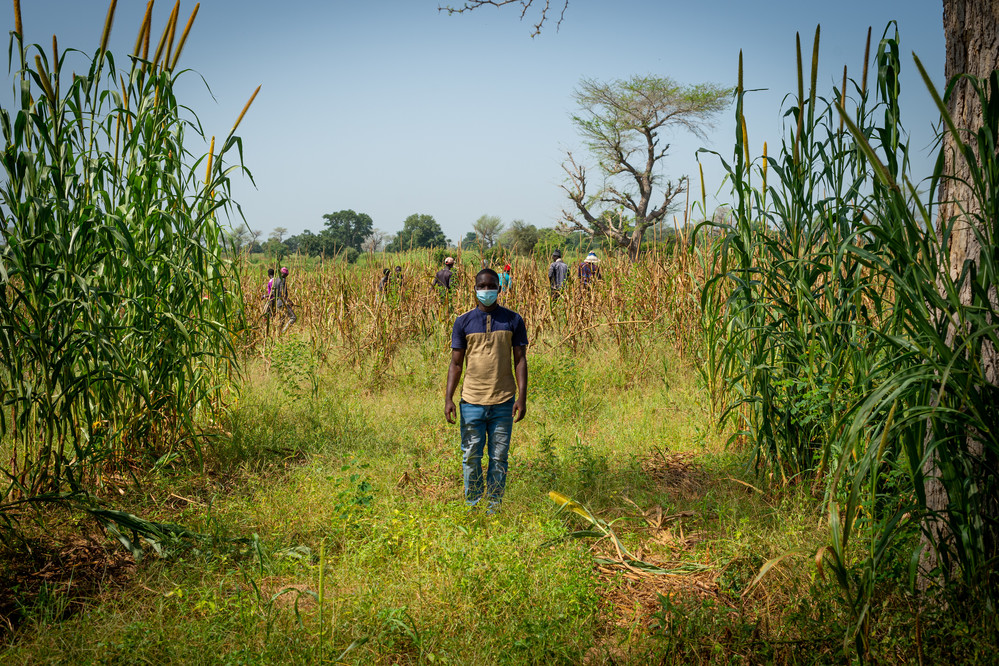USAID and the Africa Trade and Investment (ATI) Program created a Liberia Agribusiness Incubator to support job creation, trade and investment. ATI/USAID identified barriers for rural applicants including the length of the concept note. As a result, the application process was adapted to overcome these barriers; for example, the concept note was reduced to six pages with very specific short response questions.
To attract local applications and raise awareness of the new application process, ATI/USAID conducted outreach in rural communities. A Liberian events and brand awareness company, Talentia Africa, was recruited. This company, in consultation with ATI/USAID designed materials adapted to the local context including a jingle, flyers, banners and other media messaging that explained the application process outlining eligibility criteria, the number of pages for the concept note, timeframe for submission and a local number to contact for further inquiries. All of the materials were developed in the local vernacular and the simplest Liberian English. These materials were used in roadshows, talk shows, mobile vans, etc.
Roadshows were designed to raise awareness and generate interest, creating a decentralized approach focused on rural communities. Talentia Africa has held roadshows in four of the fifteen counties, bringing together 335 local agribusinesses, some of whom were emerging and small businesses.
The roadshows kicked off with talk shows on the local radio stations where the application process was explained. The radio shows also gave listeners the opportunity to phone in with their questions that were addressed by ATI.

Photo: USAID
The jingle was played through mounted speakers on a mobile van that drove through the streets of each county where the roadshows were held, attracting more agribusinesses to the event.
Following the roadshows, town halls were organized by Talentia Africa’s local point of contacts. The town halls allowed USAID to have face-to-face engagement with participants to present the Agribusiness Incubator, ask questions and walk through the application process. It also gave USAID the opportunity to listen to the communities; they shared their frustrations with the lack of access to finance and formal registration process, as well as challenges for applying to the incubator. One of the major barriers to participation was internet access in rural communities. To address this barrier, Service Centers were established in each county, providing Internet access for agribusinesses to submit their applications. A friendly hotline number was also created for ease of outreach to the Service Center.
As a means of showing their commitment and support, the Government of Liberia through the Ministry of Agriculture and the Ministry of Commerce and Industry were also in attendance and made separate remarks at the opening ceremonies. These Government Representatives will play an important role in creating the enabling environment needed for agribusinesses to flourish.
With a well-designed and intentional effort to reach rural agribusinesses and farmers, USAID received 148 concept notes for the Annual Program Statement (APS), far exceeding expectations. This included applications from some of Liberia’s most remote and hard-to-reach counties. Through the public awareness and engagement efforts, barriers were identified, and changes were made to reduce those barriers to ensure rural participation from farmers, input suppliers, market traders and agricultural logistic actors. All applicants, whether shortlisted or not, received feedback on their concept note and many were motivated to resubmit their application.
With lessons learned from the APS roadshows, coupled with the results achieved, and armed with this knowledge, USAID/ATI innovated and hosted another localization forum to efficiently and effectively implement the Incubation component of its Agribusiness Incubator and Development Activity. As a custom, the Request For Proposal (RFP) is normally unilaterally prepared by USAID and published to attract offerors for any given intervention. This time, USAID/ATI decided to do a co-creation exercise of the RFP with local Business Development Firms in the country. The rationale for this approach was to tap into the expertise of these local organizations that have worked on similar interventions in the country so as to incorporate the local context. The participants shared key insights on the Liberian business context and agribusinesses’ needs. Together with the participants, the 15 counties in Liberia were divided into three zones for offerors to apply to, one firm will be selected to run the incubation program in each zone. The selected firms will run cohorts of 25 small and emerging businesses/entrepreneurs at a time for a duration of 8 months.
The Agribusiness Incubator will continue for 3 years. Participants were appreciative of the co-creation event and leading in the parameters and design of this component of the project. “This is USAID/Liberia’s first time doing such with partners and I think this is a great step towards allowing the locals to drive development,” a participant added.

Photo: USAID
This co-creation provided the opportunity to structure the RFP based on local needs and considerations. The RFP took into consideration all the inputs from the local incubators/accelerators, thereby making the RFP more local-context specific and that attracted 12 submissions with three very vibrant local companies emerging as subcontractors.
USAID/Liberia is excited about its Agribusiness Incubator and Development Activity and anticipates getting the needed results through its direct engagement with the private sector. A cookie cutter approach of “one-size-fits-all” does not always work. Development interventions must be adapted to the local context if we want these interventions to be sustainable and impactful. For too long, we have worked with traditional international implementing partners. It’s time to innovate. We are committed to trying new approaches. Indeed, localization works!
This article was originally published by USAID

